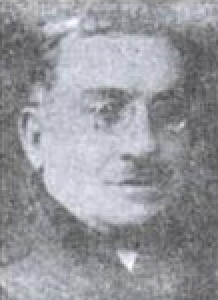Yousef El-Issa
Yousef El-Issa | |
|---|---|
 | |
| Born | 1870 Jaffa, Jerusalem Sanjak, Ottoman Empire |
| Died | 1948 (aged 77–78) |
| Occupation | Journalist |
Yousef El-Issa (alternative: Yusuf al-‘Isa) (Arabic: يوسف العيسى) was a Palestinian journalist.[1] He established the Falastin newspaper with his cousin Issa El-Issa in 1911, based in his hometown of Jaffa.[2] Falastin became one of the most prominent and long running in the country at the time, was dedicated to Arab Nationalism and the cause of the Arab Orthodox Movement in its struggle with the Greek clergy of the Orthodox Patriarchate of Jerusalem. They were passionately opposed to Zionism and Jewish immigration to Palestine.[3][4][5][6] He has been described by a researcher to be "a founder of modern journalism in Palestine".[7] He founded a newspaper entitled AlifBa in Damascus in March 1930.[8]
Al Muqattam, one of the most read dailies in Egypt, commented in an editorial when El-Issa was editor-in-chief (1911-1914): “Heads of Arabs in all major cities bend to the editorials of Ustad Yousef EL-Issa.[7]
References[edit]
- ^ Mustafa Kabha. "The Palestinian People: Seeking Sovereignty and State" (PDF). Rienner.com. Retrieved 25 December 2016.
- ^ Palestinian Personalities, Palestinian Academic Society for the Study of International Affairs (PASSIA), archived from the original on 16 March 2016, retrieved 25 July 2007
- ^ Issa al Issa’s Unorthodox Orthodoxy: Banned in Jerusalem, Permitted in Jaffa, Salim Tamari, 2014, Jerusalem Quarterly, Institute for Palestine Studies
- ^ "Jaffa - يافا -Jaffa". Palestine Remembered. Retrieved 25 December 2016.
- ^ "Filastin (journal)". Cosmos.ucc.ie. 14 January 1911. Archived from the original on 26 October 2012. Retrieved 25 December 2016.
- ^ Emanuel Beška (2016). "From Ambivalence to Hostility: The Arabic Newspaper Filastin and Zionism, 1911–1914". Studia Orientalia Monographica. 6.
- ^ a b Beska, Emanuel (2018). "Yusuf al-'Isa: A Founder of Modern Journalism in Palestine". Jerusalem Quarterly. 74 (74): 7–13.
- ^ Sarah Ozacky-Lazar; Mustafa Kabaha (2002). "The Haganah by Arab and Palestinian Historiography and Media". Israel Studies. 7 (3): 58. doi:10.1353/is.2003.0008. JSTOR 30245595.
- 1870 births
- 1948 deaths
- Anti-Zionist Christians
- Arab people in Mandatory Palestine
- Eastern Orthodox Christians from Palestine
- People from Jaffa
- 20th-century Palestinian journalists
- Palestinian newspaper founders
- Palestinian newspaper publishers (people)
- Palestinian nationalists
- 20th-century journalists from the Ottoman Empire
- 20th-century newspaper founders
- 20th-century newspaper publishers (people)
